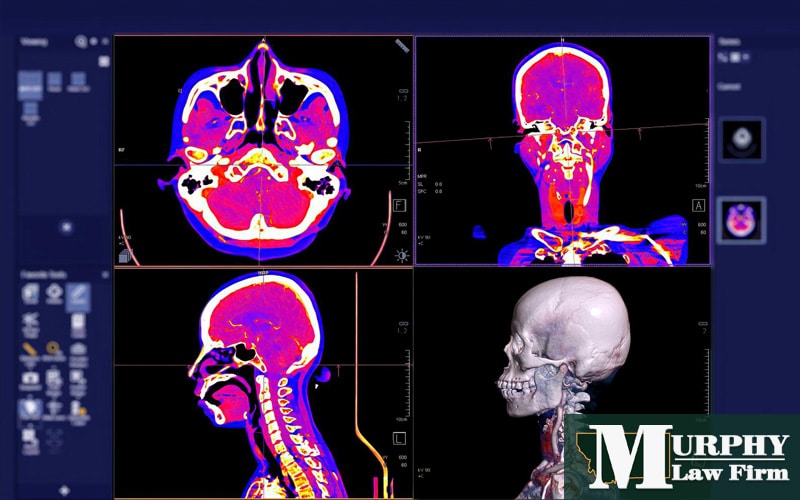
Learn how to file a claim for workers’ comp after a brain bleed injury at work
A brain bleed is another name for a brain hemorrhage, which occurs when blood vessels in the brain burst. Because brain tissues are tightly packed within an inflexible skull, bleeding causes these tissues to swell with little room to accommodate this swelling.
The swelling compresses other blood vessels and constricts blood flow to other parts of the brain. Without blood flow, brain tissue dies and cannot be revived.
A brain hemorrhage can result in death. Among the numerous causes of a brain hemorrhage, trauma to the head is the most prevalent.
Causes of a brain bleed
In the workplace, a brain bleed usually occurs as a result of head trauma from one of the following:
- Vehicle accidents
- Forklift accidents
- Falling objects
- Getting struck by an object or machinery
Other causes of a brain bleed include the following:
- Spontaneous blood vessel rupture (aneurysm)
- High blood pressure
- Brain tumors
- Accumulation in arteries of fatty deposits (atherosclerosis) or amyloid protein (cerebral amyloid angiopathy)
- A blood clot that travels to the brain and causes an artery to impede blood flow to brain tissue or bursts a brain blood vessel
- A leak from malformed connections between arteries and veins (arteriovenous malformation)
- Blood thinner medication
- Smoking, heavy alcohol use, or use of illegal drugs such as cocaine
- Abnormal collagen formation that weakens blood vessel walls
Signs and symptoms of a brain bleed
A brain bleed is indicated by the following symptoms:
- Unequal pupil sizes
- Severe headache
- Vomiting
- Blurred vision
- Dizziness
- Drowsiness
- Confusion
- Slurred speech
- Loss of consciousness
- Seizures
- Death
Treatments for a brain bleed
A brain bleed that deprives the brain of oxygen is a medical emergency that requires immediate care to avoid permanent damage or death. That includes medication or surgery to stop the bleeding and minimize swelling of brain tissues.
Surgery is the fastest and most effective response to stop the bleeding, remove pooling blood, and reduce the pressure that causes swelling. A ventricular drain is usually inserted, and medication is administered to lower blood pressure.
A delay in diagnosis or treatment can lead to death or long-term disability. Sometimes the symptoms of a brain bleed are misdiagnosed as hydrocephalus (a buildup of cerebrospinal fluid in the brain), which has similar symptoms. But hydrocephalus is treated with corticosteroids, which are very harmful in the case of a brain bleed.
Long-term effects of a brain bleed
The long-term effects of a brain bleed depend on a number of factors, including:
- The cause of the bleed
- The location within the brain
- The size of the bleed
- The length of time it takes to stop the bleeding
It’s important to understand that brain cells that die from a loss of oxygen do not regenerate. However, a brain hemorrhage does more than deprive brain tissue of oxygen. The pressure buildup also compresses nerve cells, preventing them from communicating with other parts of the body and impeding the functions that those nerves control.
The long-term consequences of a brain bleed can include the following:
- Loss of memory and cognitive functions
- Impaired speech
- Impaired muscular functions
- Paralysis
With rehabilitation services, some of those functions can be completely or partially restored. However, some patients remain in a coma or have permanent disabilities. Those patients will require long-term or lifetime care.
Montana workers’ compensation law
A major cause of brain bleeds is head trauma, which is an all-too-common occurrence in the workplace. Montana, like all other states, has a workers’ compensation system that compensates employees for a job-related injury or illness.
Workers’ compensation is a no-fault insurance system. An employee can file a claim for benefits without proving that their employer was at fault. However, workers’ comp benefits are the exclusive remedy for injured workers, which means they are not allowed to sue their employer under state personal injury law to recover pain and suffering or punitive damages.
However, an injured worker can sue third parties (people or businesses other than their employer) who are at fault for their illness or injury, such as the manufacturer of defective equipment that caused the accident resulting in the brain injury.
In Montana, with a few narrow exceptions, all employers with even 1 employee must cover their employees with workers’ comp benefits. Most employers satisfy their obligations with insurance. A few large companies may qualify to self-insure.
Employers and their insurance companies are naturally inclined to resist or decline employee benefit claims because claims raise employers’ premiums and affect insurance company profits.
While an injured worker does not have to prove that the employer was a fault, they do have the burden to prove other elements. In Montana, an employee’s injury must be caused by an accident that is defined in Montana Statutes §39-71-119. Among other things, the accident must be an “unexpected traumatic incident.”
Types of workers’ comp benefits in Montana
Montana workers who suffer an on-the-job injury or illness are entitled to the following types of benefits:
- Medical coverage for all necessary medical treatment and equipment
- Disability payments (temporary or permanent, partial or total)
- Lost wages to cover two-thirds of their average weekly wages
- Death benefits (to the deceased employee’s surviving dependents)
Like most other states, Montana law provides benefits only for injuries and illnesses that arise in the course and scope of the worker’s employment. This element is perhaps the grounds most often raised by employers for denial of benefits.
Given the numerous causes of a brain bleed, the claimant for workers’ comp benefits might be challenged to prove that their brain bleed was caused by a workplace accident rather than some other spontaneous cause.
Therefore, a worker seeking to claim workers’ comp benefits for a brain bleed should seek the guidance of an attorney. That attorney should have a successful track record for workers’ comp claims, and they should be contacted soon after the workplace injury.
Which Montana workers are eligible for benefits?
You must be an employee to claim workers’ comp benefits for an on-the-job injury. In Montana, an employee is defined by Montana Statute §39-71-118(a) as follows:
“Each person in this state, including a contractor other than an independent contractor, who is in the service of an employer, as defined by 39-71-11, under any appointment or contract of hire, expressed or implied, oral or written.”
In other words, an eligible employee is anybody normally thought of as an employee except for an independent contractor and anybody specifically excluded by statute. Montana law provides a few very narrow exceptions, including:
- Domestic or household workers
- Family members
- Sole proprietors
- Corporate officers and LLC members
How to file a workers’ comp claim in Montana
Montana’s workers’ comp system is administered by the Department of Labor and Industry and the Montana State Fund under Chapter 71 of the Montana Code.
If you’re injured on the job, you must comply with specific rules or your employer and their insurance company will leap at the chance to deny your workers’ comp claim.
There are many pitfalls along the way to claiming benefits. For that reason, you should seek the guidance of an experienced workers’ comp lawyer early in the process:
- You should seek medical care and diagnosis as soon as possible. This will prevent your injury or illness from progressing and also provide evidence that the incident is related to your work.
- Your next step is to report your injury/accident or illness to your supervisor or employer as soon as possible. You must give that notice within 30 days. Your notice must include the time and place of the accident and the nature of your injury.
- Next, your employer must submit a written and signed First Report of Injury (FROI) within 6 days of being notified of your injury or illness.
- You must file a claim within 12 months from the date of the accident or discovery of the illness. This claim must be submitted to your employer, their insurer, and the Montana Department of Labor and Industry.
- Upon receipt of your claim, the employer’s insurer has 30 days to accept or deny your claim.
- If your claim is denied, you can appeal to the Department of Labor and Industry. If denied there, you can appeal to the courts. If you haven’t already done so, you should get the help of an experienced workers’ comp attorney to ensure your rights are protected.
Prevention of workplace brain injuries
The Occupational Safety and Health Administration (OSHA) publishes safety rules and requirements for employers to keep workers safe. Standard 29 CFR 1926.100(a) states:
“Employees working in areas where there is a possible danger of head injury from impact, or from falling or flying objects, or from electrical shock and burns, shall be protected by protective helmets.”
Violations of OSHA safety requirements can cost an employer substantial fines.
Employers should enforce their own safety guidelines that should be posted prominently at appropriate locations throughout the workplace. They should also conduct periodic safety workshops for their employees.
Above all, employers should focus on preventing those accidents that commonly cause head trauma and brain injuries.
Contact a Montana workers’ compensation attorney
Filing a claim for workers’ comp benefits can be a challenge. Employers and their insurance companies don’t like to pay claims. If you don’t follow the claim procedures, your claim is likely to be denied.
Additionally, while workplace brain injuries can cause brain bleeds, some brain bleeds are spontaneous, such as aneurysms caused by high blood pressure or other non-traumatic events, which can make linking a brain bleed to a workplace accident challenging.
An experienced work injury attorney can help you gather evidence to prove your claim and ensure all necessary paperwork is filed on time to ensure your chance at compensation. At Murphy Law Firm, our Great Falls, Montana, workers’ compensation lawyers have more than 75 years of experience helping workers across Montana get maximum compensation after a work-related injury or illness.
Contact us today to learn more about your legal options and receive a free case evaluation.


